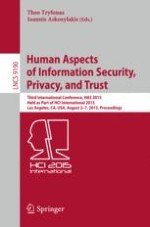2015 | OriginalPaper | Buchkapitel
Re-designing Permission Requirements to Encourage BYOD Policy Adherence
verfasst von : Lotus Lee, Jeremiah D. Still
Erschienen in: Human Aspects of Information Security, Privacy, and Trust
Aktivieren Sie unsere intelligente Suche, um passende Fachinhalte oder Patente zu finden.
Wählen Sie Textabschnitte aus um mit Künstlicher Intelligenz passenden Patente zu finden. powered by
Markieren Sie Textabschnitte, um KI-gestützt weitere passende Inhalte zu finden. powered by
